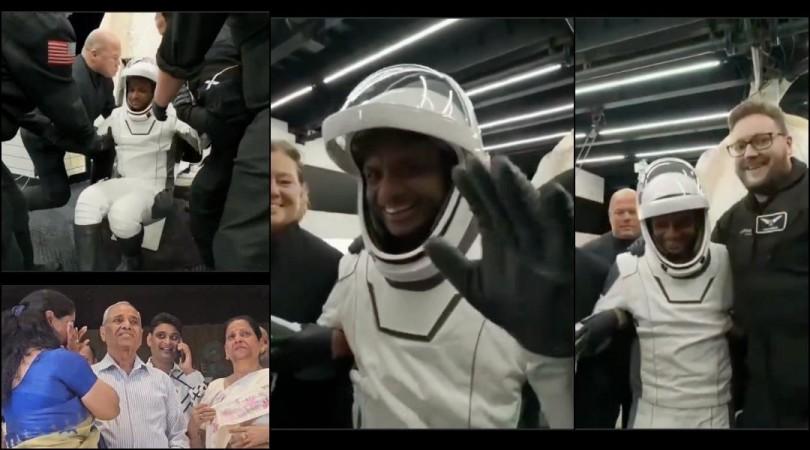
Indian astronaut and IAF Group Captain Shubhanshu Shukla has safely returned to Earth after a groundbreaking mission aboard the International Space Station (ISS). This historic achievement marks Shukla as the first Indian astronaut to visit the ISS, and only the second Indian to travel to space, following Rakesh Sharma's 1984 journey. The atmosphere at Shukla's family home in Lucknow was one of overwhelming emotion, pride, and celebration as news of his safe return spread. The mission, part of Axiom Space's Axiom-4 (Ax-4), concluded with a successful splashdown in the Pacific Ocean off the California coast at 3:00 PM IST.
The return of the SpaceX Dragon spacecraft 'Grace', carrying Shukla and his fellow astronauts, was a testament to the meticulous planning and execution of the mission. Shukla's family expressed their heartfelt emotions upon his return.
His mother, Asha Shukla, shared her excitement and relief, stating, "The excitement must be visible on our faces. We're extremely eager and overwhelmed with emotion, knowing that our son has finally returned to Earth today. I want to thank everyone for this. It's very emotional to see my son after so many days. Our excitement is endless — we are very proud."
His sister, Shuchi Mishra, echoed these sentiments, saying, "Honestly, I couldn't sleep last night; there was just so much excitement. I have butterflies in my stomach right now. I want to thank everyone. We were waiting for this moment. He has finally come back. We are so happy." His father, Shambhu Dayal Shukla, also expressed gratitude, "I want to thank God that he has finally landed back on Earth. I also want to thank everyone who has given their blessings to our child. He has returned from a place from where there was little chance of coming back."
Milestone for India's Space Program
The mission was not only a personal triumph for Shukla and his family but also a significant milestone for India in human spaceflight. The Axiom-4 mission, which included astronauts Peggy Whitson from the US, Slawosz Uznanski-Wisniewski from Poland, and Tibor Kapu from Hungary, was a collaborative effort that showcased international cooperation in space exploration. The crew's journey back to Earth was a 22.5-hour-long endeavor, following an 18-day stay at the ISS.
The return journey was not without its challenges. The spacecraft underwent an 18-minute-long de-orbit burn over the Pacific Ocean, re-entering Earth's atmosphere and experiencing a blackout period where communication signals were lost for about seven minutes. Final preparations for re-entry included detaching the capsule's trunk and orienting the heat shield, exposing the spacecraft to temperatures nearing 1,600 degrees Celsius. Parachutes deployed in two stages, first stabilizing chutes at about 5.7 km altitude, followed by the main parachutes at roughly two km before splashdown.
The successful completion of the mission has been hailed as a significant step forward for India's space program. The Indian Space Research Organisation (ISRO) has recognized the value of Shukla's experience for future missions, particularly the Gaganyaan mission, which aims to send Indian astronauts into space on an indigenous spacecraft. Prime Minister Narendra Modi also acknowledged the mission's success, stating that Shukla's journey has inspired billions and represents another milestone towards Gaganyaan.
Our hero has returned! ??
— Piyush Goyal (@PiyushGoyal) July 15, 2025
Group Captain #ShubhanshuShukla's successful completion of the historic Axiom Mission 4 is a giant leap for India's space dreams and a powerful step toward Gaganyaan. The nation is filled with pride. ??? pic.twitter.com/rSEhnhjZ1v
Celebrations and National Pride
Back home, the Shukla family and the nation celebrated with joy and pride. In Lucknow, the family prepared to welcome Shukla with open arms, while in Varanasi, residents performed a special 'yagya-havan' for his safe return. The ceremony, marked by devotion and patriotic pride, saw priests chanting Vedic mantras as flames of the sacred fire rose towards the sky, mirroring the celestial heights from which Shukla had returned.
Shukla's mission has not only been a personal achievement but also a source of national pride. His journey to the ISS and back has captured the imagination of millions, inspiring a new generation of aspiring astronauts and space enthusiasts. The mission's success has also highlighted the importance of international collaboration in space exploration, as countries work together to push the boundaries of human knowledge and capability.
Historically, India's space program has made significant strides since its inception. The country's first satellite, Aryabhata, was launched in 1975, and since then, ISRO has achieved numerous milestones, including the successful Mars Orbiter Mission in 2014, which made India the first Asian nation to reach Martian orbit and the first nation in the world to do so in its first attempt. Shukla's mission to the ISS is a continuation of this legacy, showcasing India's growing capabilities in space exploration.
Lucknow: Group Captain Shubhanshu Shukla's family rejoices as the Axiom-4 Dragon spacecraft safely returns to Earth.#ShubhanshuShukla | #AxiomMission4 | #Axiom pic.twitter.com/b1EgIIw3su
— All India Radio News (@airnewsalerts) July 15, 2025
As Shukla returns to Earth, his mission serves as a reminder of the potential for human achievement and the power of dreams. His journey has not only made history but has also paved the way for future generations of Indian astronauts. The excitement and pride felt by his family and the nation are a testament to the impact of his achievement, inspiring countless others to reach for the stars.
Related

















